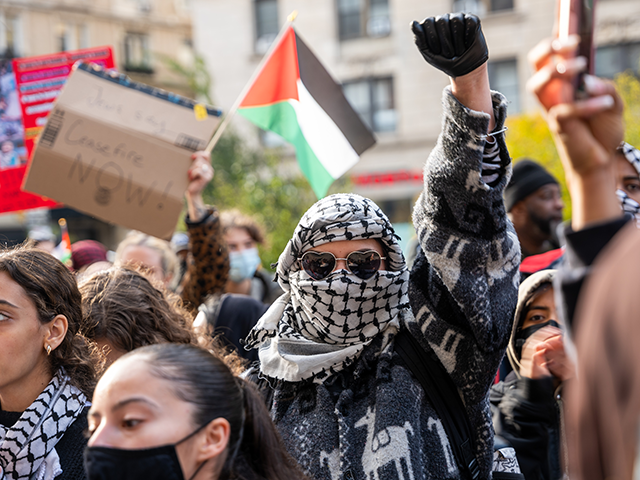Anti-Israel campus protests, like the infamous and sometimes violent demonstrations at Columbia University, are a symptom of a culture that is focused more on destruction than on creation and innovation, Columbia Trustee Dr. Shoshana Shendelman explained in an interview Monday with Breitbart News Daily host Mike Slater.
“I think it’s been surprising and eye-opening to a lot of people how quickly things have sort of gone out of control in some of these situations. And I don’t think it’s just on campuses. I think this is happening in many different situations across our nation, and I think what’s happened at universities like Columbia is just a microcosm for what we’re seeing more globally,” said Shendelman, who also serves as vice chair for the Board of Advisors at Columbia University Medical Center and the Columbia University College of Physicians and Surgeons.
Shendelman, who is of Persian-Jewish descent, has been described as “one of the most active board members in the pro-Israel camp pushing for action to restore order on campus,” a stance which has made her the target of some media attacks. Columbia University has been ground zero for campus anti-Israel unrest in the wake of the horrific attack perpetrated by Hamas terrorists in Israel October 7, 2023, and the subsequent and ongoing Israel-Palestinian conflict.
In April 2024, an anti-Israel encampment was established at Columbia University, which resulted in the arrests and suspensions of some of the students protesters. After the dispersal of the first encampment, a second one was established and remained until the New York Police Department conducted a raid after protesters seized control of Columbia’s Hamilton Hall. The anti-Israel encampment at Columbia University inspired others to be established at universities across the country, including George Washington University, Yale University, the Massachusetts Institute of Technology, and the University of Southern California, among others.
“I think this is really a moral choice that we’re facing right now as a nation. Do we elevate ourselves? Do we grow and create?… Do we take that to our universities and empower our students to think critically and to grow? Or do we permit this intimidation and this destruction to silence opposing views?” Shendelman said. “I think that this could really destroy our generation. So, I think it’s important that people who have the ability to lead — and I think I’m really fortunate to be in that situation — can lead by example, can speak out, and can help our generation to rebuild.”
“I think that’s really what we have to get back to. We as a nation have to get back to building,” she added. “My call to action, or what I’m hoping listeners will take away from this conversation, is that we need to lead by example and teach the next generation to build, in order to propel our society forward and to contribute something positive by creating, rather than destroying.”
Shendelman posited that the trend toward destructive activism on campuses has arisen because many people are “looking for a purpose for their life.”
“And I think it’s very easy to find that moment and something loud, like destruction,” she said. “It’s harder, but I think overall it’s much more meaningful, to think about what’s your positive purpose in life?…I’m really one of those people who believes that we all have something to contribute to the world, that we can all make the world a better place, and we all have skills or experiences that are unique to us, and that involves some thought and a lot of hard work.”
“It’s really easy to show up at a protest and shut down a building. It’s a lot harder to have that level of introspection and then do the hard work, right? To first think about what can you give back to the world? What’s important to you? What skills do you have and how can you contribute positively? And then to go do that work, to build and create something,” she said. “It’s usually unglamorous work…It’s not a flash on social media.”
Shendelman said changing the culture ultimately starts “in our homes,” but she also argued that colleges should prioritize “diversity of opinion” and “adherence to nonviolent free speech.”
“We, as parents and sometimes as teachers…really need to start when they’re younger and ensure that we’re teaching them that things that are worthwhile, things that are positive, things that create something good for the world are not fast and easy. It’s not Amazon overnight shipping,” she said. “We can, number one, lead by example, but number two, really teach those values from a young age.”
“And it’s important that our nation’s institutions, especially our top institutions, where our youngest leaders continue to grow, that they grow through diversity of opinion,” she continued. “We need to ensure that there’s adherence to nonviolent free speech, non-intimidation, and that we show, again, I think through leadership and through setting an example, a willingness to hear ideas that are different from our own and to learn with an open mind.”
Breitbart News Daily airs on SiriusXM Patriot 125 from 6:00 a.m. to 9:00 a.m. Eastern.
Katherine Hamilton is a political reporter for Breitbart News. You can follow her on X @thekat_hamilton.


